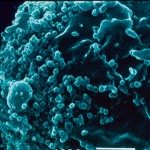Lien vers Pubmed [PMID] – 22242197
PLoS ONE 2012;7(1):e30017
During the first trimester of human pregnancy, Natural Killer (NK) cells of the maternal uterine mucosa (e.g. decidua) have a unique phenotype and are involved in crucial physiological processes during pregnancy. We investigated whether modifications of the NK receptor repertoire occur during the first trimester of pregnancy. We found significantly decreased expression of KIR2DL1/S1 and KIR2DL2/L3/S2 receptors, NKp30 and NKp44 activatory receptors, and the CD85j (ILT-2) inhibitory receptor. We also observed significantly increased expression of the NKG2D activatory receptor at the decidual NK cell surface. By flow cytometry, we further highlighted an evolution of NK subsets between 8 and 12 weeks of gestation, with a shift from the KIR2DL1/S1⁺/KIR2DL2/L3/S2⁺ subset towards the double negative subset, coupled with a decrease of the CD85j⁺/NKG2D⁻ subset in favour of the CD85j⁻/NKG2D⁺ subset. Furthermore, cell surface expression of NK receptor ligands, including CD85j and NKG2D ligands, has been characterized by flow cytometry on decidual immune CD14⁺ and CD3⁺ cells. HLA-G, the high affinity ligand of CD85j, was detected on both cell types. In contrast, NKG2D ligands ULBP-2 ULBP-3 and MICA/B were not expressed on CD14⁺ and CD3⁺ cells, however a variable expression of ULBP-1 was observed. The ligand expression of KIR2DL1/S1 and KIR2DL2/L3/S2 was also analyzed: the HLA-C molecule was expressed at a low level on some CD14⁺ cells whereas it was not detected on CD3⁺ cell surface. NK receptor ligands are known to be also expressed on the invading placental trophoblast cells. Thus, the phenotypic evolutions of decidual NK cells described in this present study may preserve their activation/inhibition balance during the first trimester of pregnancy.




